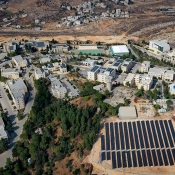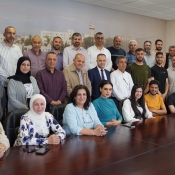Masari, blurring the lines of traditional academic programs, holds dialogue session for its facilitators
“This is an immensely creative program that provides students with valuable life skills and hones their personalities, it also benefits facilitators who reflect what they’re teaching onto themselves,” said President of Birzeit University Abdullatif Abuhijleh at the “Facilitator’s Journey in Masari” meeting, held on February 15, 2018 on the university’s campus.
The meeting, held by the Innovation and Entrepreneurship Unit in cooperation with the Center for Continuing Education, comprised a dialogue session with the facilitators who made the Leadership and Active Citizenship Program – Masari – a success and solicited their feedback on the program and its progress.
Vice President for Planning and Development Dr. Mirvat Bulbul expressed her pride in the program and its facilitators and noted that the Fall Semester will feature 60 facilitators who were trained both in the summer and in the period in-between the two academic semesters.
Vice President for Academic Affairs Dr. Faisal Awadallah highlighted the ever-changing nature of today’s world, saying “The world is changing rapidly. New technologies and models are changing how we interact and react to one another, whether at places of work or at educational institutions. We must adapt to these changes and reflect them in the teaching process. This, of course, requires a constant process of calibration and adjustment for both students and instructors.”
Vice President for Community Affairs Dr. Asem Khalil noted the importance of the program and its continuing education component, saying “I’m very proud of this program. It provides an opportunity for both students and teachers to continuously improve themselves and adjust to the rapidly-changing marketplace and beyond.”
“It’s a reflective process,” added Dr. Khalil. “The instructors are learning about themselves and their pedagogical methods just as much as their students are learning life skills and active citizenship.”
Unit for Leaning Innovation Director at the Center for Continuing Education Osama Mimi emphasized the importance of such experiences, which, as he says, “are meant to enhance the process of change and development in Birzeit University”. He also highlighted the pioneering role of the university in offering such a program, which is equal in importance to an academic degree.
“The program,” added Mimi, “falls within the mission of the university, which is to foster a cohesive society based on knowledge and economic sustainability. One of the advantages of the program is that it is implemented with Palestinian minds, support, and funds.”
The meeting also aimed to solicit the feedback and ideas of the facilitators, who shared their comments and suggested places of possible improvement in the program. Certificates were handed out at the end of the meeting to the facilitators in recognition of their efforts in upholding Birzeit University’s vision to graduate leaders in all walks of life.
The Leadership & Active Citizenship Program, which is aimed at all first-year students from all majors, was launched to bolster the university’s role in developing a renewed vision for learning and to incentivize students to plan their lives and engage in their surroundings from the first day they step foot on the university’s campus.
The program creatively integrates the experiences of both academics and staff at Birzeit University into a series of distinctive lectures that blur the boundaries of the traditional academic model.
In its first year, the program focuses on self-exploration, self-discovery, self-awareness, and self-management through the Personal Competencies and Career Path stations; in the second year, it emphasizes the other and the community (active citizenship skills – diversity, empathy, and sharing) through the Debating and Citizenship stations.
The third year will highlight the development and implementation of student initiatives that stem from the students’ outlook on Palestinian national contexts and community priorities through two stations focused on community entrepreneurship.









